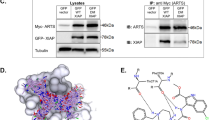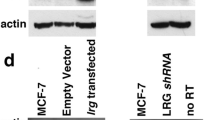Abstract
Programmed cell death, or apoptosis, is inhibited by the antiapoptotic oncogene, Bcl-2, and is mediated by a cascade of aspartate-specific cysteine proteases, or caspases, related to interleukin 1-β converting enzyme. Depending on cell type, apoptosis can be induced by treatment with thapsigargin (TG); a selective inhibitor of the endoplasmic reticulum-associated calcium-ATPase. The role of caspases in mediating TG-induced apoptosis was investigated in the Bcl-2-negative human breast cancer cell line, MDA-MB-468. Apoptosis developed in MDA-MB-468 cells over a period of 24 – 72 h following treatment with 100 nM TG, and was prevented by Bcl-2 overexpression. TG-induced apoptosis was associated with activation of caspase-3 and was inhibited by stable expression of the baculovirus p35 protein, an inhibitor of caspase activity. Also, TG-induced apoptosis was inhibited by treating cells with Z-VAD-fmk, a cell-permeable fluoromethylketone inhibitor of caspases. These findings indicate that TG-induced apoptosis of MDA-MB-468 breast cancer cells is subject to inhibition by Bcl-2 and is mediated by caspase activity. This model system should be useful for further investigation directed toward understanding the role of calcium in signaling apoptosis, and its relationship to Bcl-2 and the caspase proteolytic cascade.
Similar content being viewed by others
Author information
Authors and Affiliations
Rights and permissions
About this article
Cite this article
Qi, XM., He, H., Zhong, H. et al. Baculovirus p35 and Z-VAD-fmk inhibit thapsigargin-induced apoptosis of breast cancer cells. Oncogene 15, 1207–1212 (1997). https://doi.org/10.1038/sj.onc.1201290
Received:
Revised:
Accepted:
Issue Date:
DOI: https://doi.org/10.1038/sj.onc.1201290
- Springer Nature Limited
Keywords
This article is cited by
-
Microbial inhibitors of cysteine proteases
Medical Microbiology and Immunology (2016)
-
Involvement of c-Fos in signaling grp78 induction following ER calcium release
Oncogene (2000)
-
Induction of apoptosis by the transactivating domains of the hepatitis B virus X gene leads to suppression of oncogenic transformation of primary rat embryo fibroblasts
Oncogene (2000)
-
Etk/Bmx, a PH-domain containing tyrosine kinase, protects prostate cancer cells from apoptosis induced by photodynamic therapy or thapsigargin
Oncogene (1999)




